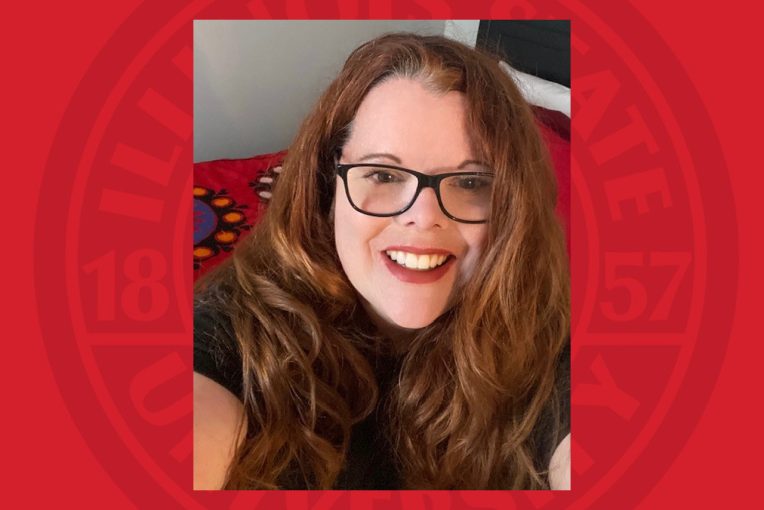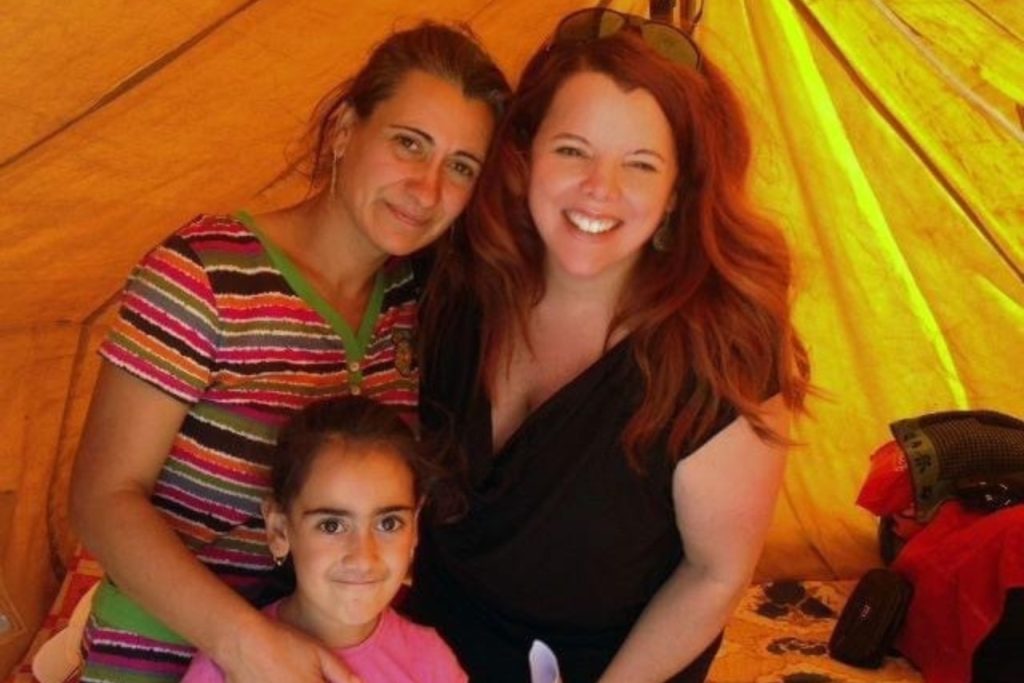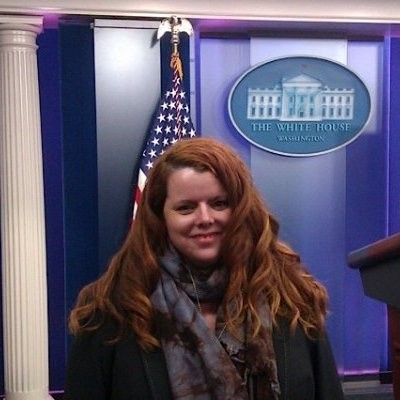For the past 12 years, Susan J. Megy, M.A. ’03, has worked in and out of conflict zones and developing countries.
“I’ve dodged mortar shelling and sniper fire on the frontlines of eastern Ukraine, hunkered behind T-walls and razor wire in Baghdad, delivered aid to Iraqi Yazidis fleeing ISIS in northern Iraq, navigated mud oles the size of Wisconsin in the Liberian bush, and worked with Rohingya refugee women in Bangladesh. I’ve also lived and worked in ‘calmer’ locales like Bulgaria, Ghana, Jordan, Ireland, Chicago, Washington D.C., San Francisco, Seattle, New Orleans, Albuquerque, and Honolulu,” she shared.
In 1992, Megy joined the Navy as a photojournalist at Pearl Harbor Naval Station. She always felt the desire to serve and recognized the importance of it: to oneself, country, and community. With the job, Megy had an opportunity to meet two U.S. presidents, fly in an F-18 over the Hawaiian Islands, and photograph forensic crime scenes used for the popular television series NCIS. Operating in diplomatic environments and working as the personal photographer to a four-star admiral was a life-changing experience that led to discipline, resilience, respect for other cultures and communities, and an understanding of the value of hard work.
“I do think my military service made me brave and more willing to take risks in life generally,” she said. “My experiences serving in the Navy taught me the value of service to something bigger than oneself. Even though my humanitarian work came years after my military service, that need to do something for the greater good always stuck with me. It sort of permeates everything I try to do and be in this world.”
Megy completed her undergraduate degree in 2000, earning a bachelor’s in political science and government at Chaminade University in Honolulu. In 2001, she started her master’s through Illinois State University’s Stevenson Center’s Applied Community and Economic Development program.
Choosing a university to pursue a master’s degree wasn’t a random choice; Megy’s journey began with her father, Dr. Robert Baker, a former professor in Illinois State’s College of Education. His stories of travels, especially those leading student groups to China, weren’t just for travel’s sake but for learning about common humanity.
“I felt like when other people questioned my plans or need to be abroad, he was the one who truly got it. He was my champion. In fact, he was in-country during the Tiananmen Square massacre in 1989,” Megy said. “I suppose my desire to do something bigger than myself began with him.”
Megy also found inspiration in her stepfather, Dr. James Kirchner, a former geology professor at Illinois State, who lived for some time in Nigeria and Libya. Both men helped her perceive the world through a different lens.
During her time at Illinois State, Megy was focused on her studies, notably at the Stevenson Center, but she also actively engaged with the Bloomington-Normal community. What sets the Stevenson Center apart is its interdisciplinary graduate programs and hands-on internships. The center equips students with the practical skills and knowledge needed for careers in community and economic development. The perfect example of this was with Megy’s capstone and externship working at the Bloomington YWCA, where she directed a diversity and social justice program, which allowed her to learn a great deal about the way the local community viewed diversity and issues of equality. Megy also helped launch the YWCA Stepping Stones program, a sexual assault prevention program that is still running today. However, it was the collaboration with PFLAG and Countering Domestic Violence nonprofits during her studies that truly deepened her empathy for marginalized communities. Reflecting on her time at Illinois State, Megy says she had amazing professors like Dr. Robert Hunt, whose teachings on asset-based community development played a huge role in how she worked in development and humanitarian roles after graduate school.
After graduating from Illinois State in 2003, Megy joined the Peace Corps, where she provided technical to the Kardzhali municipal government in Bulgaria for a year but left the Peace Corps due to a personal security incident. Later, she joined Humanity United, and for almost two years, she led research projects on conflict prevention, peace-building, and global human trafficking and slavery. It was a no-brainer for her to continue her education to expand her knowledge and expertise in preventing conflict which is when she decided to pursue her doctorate in international humanitarian law from the National University of Ireland in Galway. Her decision was influenced by her experiences at Humanity United and her work on issues related to genocide and mass atrocities. She was looking for a different perspective on conflicts in Afghanistan and Iraq at that time.
Getting a doctorate in another country cannot be the reason to stop contributing to your own, and Megy’s journey continued to focus on conflict prevention and peacekeeping when she joined the Stimson Center to work as a visiting research analyst on the Protection of Civilians in African sub-regional peacekeeping. Her research focused on the Economic Community of West African States (ECOWAS), which is one of Africa’s sub-regions that had a reputation for effectively protecting civilians during Liberia’s two civil wars and in Sierra Leone throughout the 1990s. Research showed that ECOWAS was better equipped both with written guidance to protect civilians and a military willing to take a stronger posture in the field to save civilian lives. This early research helped inform her book chapter about African peacekeeping to prevent atrocities.
“I was a fan of the Stimson Center’s work from my time working in philanthropy. They had several thought leaders who were helping change things at the United Nations. I was so interested in continuing this work that I sort of stalked a staff member by email and sent her a draft proposal,” Megy said. “When we secured some funding, I was able to do this work as a visiting analyst, which was a dream job, but I missed being in the field!”
Staying busy as a graduate student did not stop Megy from the need to get back into the field. She joined the United Nations in 2011 and worked with the U.N. peacekeeping mission in Liberia and, alongside colleagues from the U.S. Army and Russian Navy, developed the Liberia Early Warning Network. This geographic information system involved local communities reporting conflict incidents via text, leading to almost 90% participation after training sessions with tribal and religious leaders. The gathered data enabled them to assess conflict trends and determine the causes, such as election-related issues or other factors, providing valuable insights for peacekeeping efforts.
“It was insanely difficult. I was writing chapters after a full workday, on lockdown in Baghdad and other hotspots,” she said. “I wound up taking loads of Ph.D. breaks due to work commitments. Not a method I would, in hindsight, suggest to other students pursuing a doctorate.”
From that moment, Megy spent almost eight years at the U.N. working on protecting civilians. Frustratingly, civilians still suffer the most, especially women and children. “My work focused specifically on protecting civilians to avoid mass atrocities and genocide like what we’ve seen in Darfur, Rwanda, Syria, the Democratic Republic of the Congo, Somalia, Yemen, and now, Gaza. Militaries and peacekeepers operating in active conflicts like Ukraine, Iraq, Syria, and Gaza have repeatedly failed to uphold the Laws of War/International Humanitarian Law to protect civilians,” she said.
Megy’s expertise was essential in many war zones. However, the emotional toll of witnessing civilian suffering in these tragic events is challenging. Although all humanitarians endure harsh conditions, the emotional and mental challenges they face are often incomprehensible to the average person. In Ukraine, Megy has seen people living in communities along the Line of Contact, which is a dividing line between pro-Russian territory and Ukrainian territory in the east. Every day citizens were blocked from food and medical supplies and had limited freedom of movement.
Megy wrote numerous articles as a contributing author for the United Nations throughout those eight years. She didn’t overlook any significant global experiences and events that unfolded over the past decade. This experience led her to work in the Biden administration as a speechwriter, where she writes in the secretary’s authentic voice about an array of education policy issues and highlights the Department of Education’s priorities. For the past two years, she has worked for Secretary of Education Miguel Cardona in Washington, D.C. She believes that no matter what, a good writer can thrive in any position.
When it comes to human rights and humanitarian work, Megy says the best way to start is to roll up your sleeves and just do the work. Having a strong foundation of knowledge is crucial, but the only way to truly thrive in the work is to get out there and continuously learn and do. Those interested need to be open and brave and bring humility and curiosity to what they are doing. Humanitarian work generally is not something a person falls into after studying in school, according to Megy. Fieldwork is key.
Her first U.N. position was via United Nations Volunteers. Even though the position is considered “volunteer” with a modest stipend, she did the same work as fixed-term staff in the U.N. system. During her volunteer time, Megy directed three programs during her Liberia tenure, while she took on projects that others sometimes felt were beneath them.
“Stay humble, pitch in, be open. Most importantly, stay curious and work with empathy,” she said. “If you don’t have empathy or a desire to make things better, don’t go into this work. Don’t get into this work for the pay. And don’t be too tied to outcomes. You’ll fail, but with each failure, are lessons and unexpected gains.”



